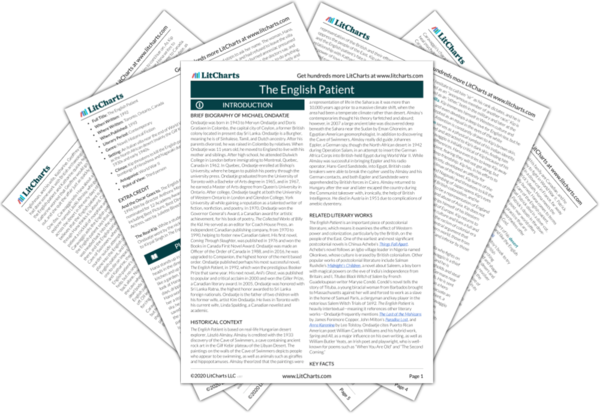Caravaggio Quotes in The English Patient
Chapter II Quotes
He sits with his hands below the table, watching the girl eat. He still prefers to eat alone, though he always sits with Hana during meals. Vanity, he thinks. Mortal vanity. She has seen him from a window eating with his hands as he sits on one of the thirty-six steps by the chapel, not a fork or a knife in sight, as if he were learning to eat like someone from the East. In his greying stubble-beard, in his dark jacket, she sees the Italian finally in him. She notices this more and more.
Chapter III Quotes
At lunch there is Caravaggio’s avuncular glance at the objects on the blue handkerchief. There is probably some rare animal, Caravaggio thinks, who eats the same foods that this young soldier eats with his right hand, his fingers carrying it to his mouth. He uses the knife only to peel the skin from the onion, to slice fruit.
Chapter VI Quotes
“Let me tell you a story,” Caravaggio says to Hana. ‘There was a Hungarian named Almásy, who worked for the Germans during the war. He flew a bit with the Afrika Korps, but he was more valuable than that. In the 1930s he had been one of the great desert explorers. He knew every water hole and had helped map the Sand Sea. He knew all about the desert. He knew all about dialects. Does this sound familiar? Between the two wars he was always on expeditions out of Cairo. One was to search for Zerzura— the lost oasis. Then when war broke out he joined the Germans. In 1941 he became a guide for spies, taking them across the desert into Cairo. What I want to tell you is, I think the English patient is not English.”
Chapter IX Quotes
We die containing a richness of lovers and tribes, tastes we have swallowed, bodies we have plunged into and swum up as if rivers of wisdom, characters we have climbed into as if trees, fears we have hidden in as if caves. I wish for all this to be marked on my body when I am dead. I believe in such cartography— to be marked by nature, not just to label ourselves on a map like the names of rich men and women on buildings. We are communal histories, communal books.

Caravaggio Quotes in The English Patient
Chapter II Quotes
He sits with his hands below the table, watching the girl eat. He still prefers to eat alone, though he always sits with Hana during meals. Vanity, he thinks. Mortal vanity. She has seen him from a window eating with his hands as he sits on one of the thirty-six steps by the chapel, not a fork or a knife in sight, as if he were learning to eat like someone from the East. In his greying stubble-beard, in his dark jacket, she sees the Italian finally in him. She notices this more and more.
Chapter III Quotes
At lunch there is Caravaggio’s avuncular glance at the objects on the blue handkerchief. There is probably some rare animal, Caravaggio thinks, who eats the same foods that this young soldier eats with his right hand, his fingers carrying it to his mouth. He uses the knife only to peel the skin from the onion, to slice fruit.
Chapter VI Quotes
“Let me tell you a story,” Caravaggio says to Hana. ‘There was a Hungarian named Almásy, who worked for the Germans during the war. He flew a bit with the Afrika Korps, but he was more valuable than that. In the 1930s he had been one of the great desert explorers. He knew every water hole and had helped map the Sand Sea. He knew all about the desert. He knew all about dialects. Does this sound familiar? Between the two wars he was always on expeditions out of Cairo. One was to search for Zerzura— the lost oasis. Then when war broke out he joined the Germans. In 1941 he became a guide for spies, taking them across the desert into Cairo. What I want to tell you is, I think the English patient is not English.”
Chapter IX Quotes
We die containing a richness of lovers and tribes, tastes we have swallowed, bodies we have plunged into and swum up as if rivers of wisdom, characters we have climbed into as if trees, fears we have hidden in as if caves. I wish for all this to be marked on my body when I am dead. I believe in such cartography— to be marked by nature, not just to label ourselves on a map like the names of rich men and women on buildings. We are communal histories, communal books.











